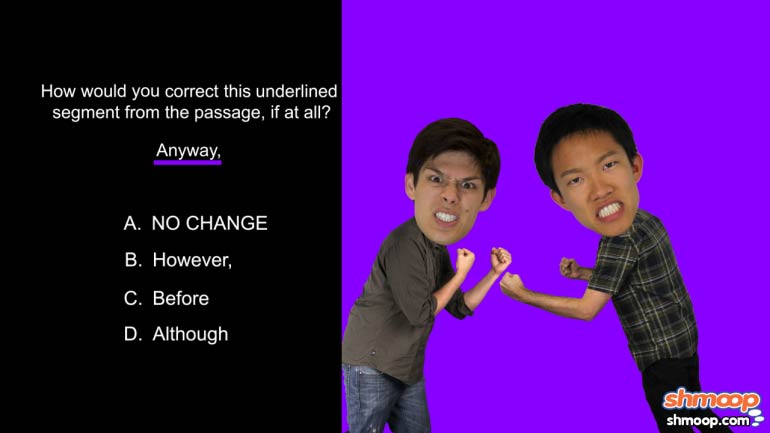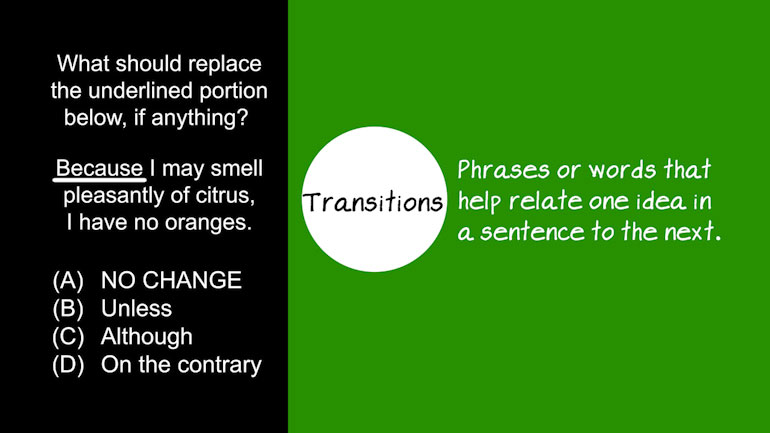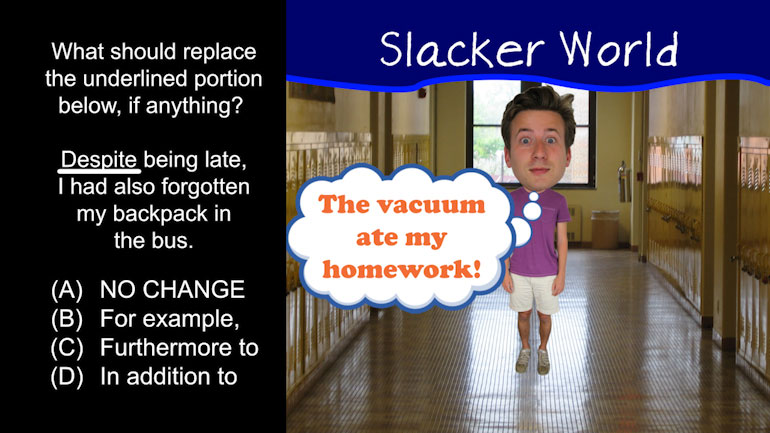ShmoopTube
Where Monty Python meets your 10th grade teacher.
Search Thousands of Shmoop Videos
Rhetorical Devices and Transistions Videos 4 videos
ACT English: Passage Drill 2, Problem 11. Which of the following sentences would make the most effective transition?
ACT English: Passage Drill 4, Problem 6. Which word creates the most logical transition between the two sentences?
ACT English: Organization Drill 1, Problem 1. Which transition works best?
ACT English 4.6 Passage Drill 174 Views
Share It!
Description:
ACT English: Passage Drill 4, Problem 6. Which word creates the most logical transition between the two sentences?
Transcript
- 00:03
Here’s your Shmoop du jour, brought to you by confused timelines.
- 00:07
So we’ve been waiting a while for this one. Check out the following passage...
- 00:19
How would you correct this underlined segment from the passage, if at all? Anyway,?
- 00:25
And here are the potential answers...
- 00:28
Here, we need to find the word that creates the most logical transition between the two sentences.
Full Transcript
- 00:33
In order to do this, we have to have a firm idea of what each sentence is
- 00:36
trying to get across.
- 00:37
We’ll take a quick glance back at the passage to get it fixed in our heads.
- 00:41
OK, so this is easy. The first sentence informs us that a lot of people think Hagiwara created
- 00:45
fortune cookies, while the second sentence says that a bunch of other people think a
- 00:49
dude named Jung had the honor.
- 00:51
Looks like these two sentences are butting heads.
- 00:54
So we’re on the hunt for a word that helps to establish this contrasting relationship.
- 00:59
Option (A) suggests the word “anyway,” but this doesn’t get across the meaning we need.
- 01:03
“Anyway” is usually used when a writer wants to move on to a new topic,
- 01:07
not when a writer is contrasting two connected ideas.
- 01:10
Anyway, now it’s time to check out option (C).
- 01:13
See what we did there?
- 01:14
Yeah, yeah...we’re not as clever as we’d like to be.
- 01:16
(C) gives us the word “before.” This doesn’t work either, though. The sentence talks about
- 01:20
how people “still hold” to a certain idea.
- 01:23
If the sentence is trying to talk about how people are still doing something, then throwing
- 01:27
the word “before” in there does nothing but confuse the timeline.
- 01:31
(D) is incorrect because "although” is what’s known as a subordinating conjunction.
- 01:37
When this type of conjunction appears before a clause, it makes that clause subordinate to another.
- 01:42
Subordinate clauses can’t exist on their own and need a main clause to hang on to.
- 01:47
If we kick off the sentence in question with “although,” it turns the entire thing
- 01:51
into a subordinate clause with no main clause to hold hands with.
- 01:54
This prospect makes us sad, so we’ll nix option (D).
- 01:57
The correct answer is (B).
- 01:59
It’s totally OK to kick off a sentence with the word “however,”
- 02:03
and the word signals contrast, making it perfect for what the writer wants to communicate.
- 02:08
When we see “however” at the top of a sentence, we know that sentence is going to
- 02:12
disagree with the sentence that came before it.
- 02:15
When will these sentences learn to get along?
Related Videos
ACT English: Punctuation Drill 2, Problem 2. Where should the semi-colon be placed?
ACT English: Punctuation Drill 3, Problem 1. How should this sentence be changed so that it is grammatically correct?
ACT English: Punctuation Drill 3, Problem 2. How should we properly hyphenate the words in this sentence?
ACT English: Punctuation Drill 3, Problem 4. Which choice best formats this list of items?
ACT English: Punctuation Drill 2, Problem 1. Which choice of punctuation best completes the sentence?








